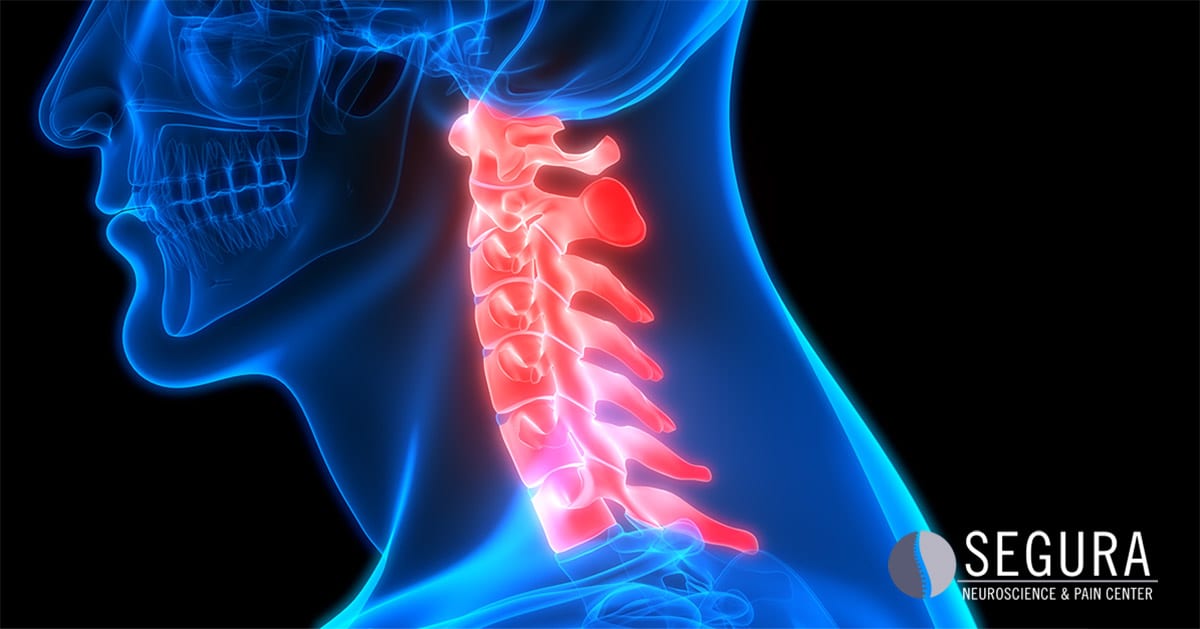
Occasional neck pain is not uncommon for most people. Usually, there’s a clear and understandable reason for the pain. Maybe you slept in a bad position, spent a long day hunched over a desk or were involved in some sort of accident or fall. In most cases, the pain is temporary and you get relief in a few hours or a few days. When neck pain persists, though, it can be a sign of a more serious condition that requires the attention of a medical professional.
What is Chronic Neck Pain?
Chronic neck pain is acute pain that has persisted or recurred for at least 12 weeks. There can be a variety of sources, ranging from simple correctable issues like poor posture to more serious issues, such as arthritis and osteoporosis.
Studies have shown that up to 30 percent of people who experience neck pain may develop chronic symptoms. Neck pain is often accompanied by a headache, and the pain may also spread to the back and arms.
A successful treatment of chronic neck pain relies on a proper diagnosis of the issue. X-Rays, CT scans and MRIs are commonly used to determine the cause of pain. Electromyography (EMG) and blood tests may also be used. Your doctor may order an EMG if a pinched nerve is the suspected culprit, and blood tests may show evidence of inflammation or infection that could be a contributing factor. There are a few conditions that commonly cause neck pain.
Cervical Radiculopathy occurs when nerves in the neck are damaged or irritated. The most common cause is a cervical disc herniation, or bulge in a spinal disc of the neck. This puts pressure on the nerves. It can also be caused by a variety of other factors, including injury, damaged cartilage or diabetic neuropathy. Cervical Degenerative Disc Disease
It is common for discs in the spine to wear and degenerate with age, but when the discs in the neck wear earlier in life than expected, it is called cervical degenerative disc disease. Typically pain caused by this condition is felt when the patient is upright and the head is in motion. It can also be accompanied by reduced movement, tingling, numbness or burning. Cervical Facet Joint Syndrome
Cervical facet joint syndrome can be caused by a number of issues, including repetitive movement, trauma or arthritis. It affects the facet joints of the neck, which provide stability and control to the spine. These joints are designed for only certain amounts of sustained stress and factors such as trauma, other spinal injuries or even simple poor posture can cause the discs to degenerate. When the discs of the neck become compressed, it can cause cervical spondylosis, the degeneration of the cushioning tissues between discs. That causes bone spurs to develop, limiting the room for the nerves to pass through the neck. The condition is more common in older patients and often the patient will notice no symptoms. What are the Treatment Options?
Once a proper diagnosis is made, there are several options for treatment. Depending on the condition, these can range from physical therapy and medication to surgical options.
Epidural Steroid Injections
A steroid injection is administered directly to the epidural area of the spine to provide pain relief and aid in healing damage. These injections may also contain pain medication or a saline solution to help flush inflammatory proteins out of the damaged areas.
Epidural steroid injections are commonly used to treat:
Medial branch blocks are injections used to numb pain in the nerves that serve the facet joints. This procedure can provide temporary relief from pain and is often used to determine if other, more permanent treatments may be effective.
Medial branch blocks are commonly used to treat:
- Cervical Facet Joint Syndrome
- Cervical Spondylosis
Radiofrequency ablation is minimally invasive and eliminates pain with the application of heat. An electrical current burns the problem nerves, preventing them from sending pain signals to the brain. It is most helpful for conditions that include inflammation.
Radiofrequency ablations are commonly used to treat:
- Cervical Degenerative Disc Disease
- Cervical Facet Joint Syndrome
- Cervical Spondylosis
Cervical Facet Radiofrequency Neurotomy
This procedure, also known as radiofrequency rhizotomy, can reduce pain through the use of radiofrequency energy to disrupt pain receptors. In cervical facet radiofrequency neurotomy, the doctor will inject a dye into the cervical branch nerve to help pinpoint the source of the issue and cauterize it with an electrode.
Cervical facet radiofrequency neurotomy is commonly used to treat:
- Cervical Degenerative Disc Disease
- Cervical Facet Joint Syndrome
A spinal cord stimulator is a small device, similar to a pacemaker in heart patients. The implant uses electrical pulses to mask pain signals to the brain. This procedure is usually reserved for patients who have not responded to more conservative treatments and for whom surgery is not an option for health reasons.
A spinal cord stimulator is commonly used to treat:
The pain pump is about the size of a hockey puck and is implanted beneath the skin, usually in the abdominal area. It is attached to a catheter in the fluid-filled space around the spinal cord known as the intrathecal space. The pump releases a measured dose of medication to interrupt pain receptors.
A spinal cord stimulator is commonly used to treat:
- Cervical Radiculopathy
- Cervical Degenerative Disc Disease
- Cervical Facet Joint Syndrome
- Cervical Spondylosis
Explore Your Treatment Options for Neck Pain
If your day-to-day experiences have been interrupted by consistent, chronic neck pain, know that there is help available. The first step in treating yourself is to schedule a consultation with one of our specialists. You can be assured that the utmost care will be taken in both diagnosing and treating your chronic back pain and that our considerate, professional staff will do everything they can to have you back to enjoying your life, pain-free.

